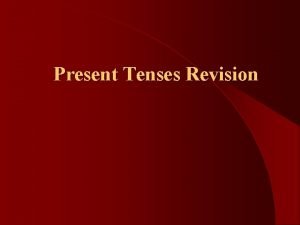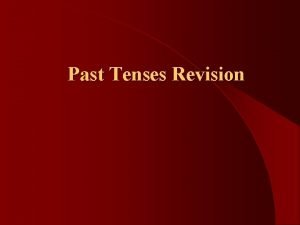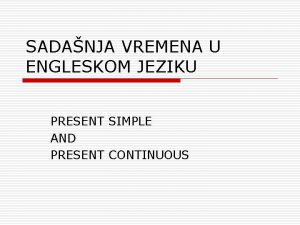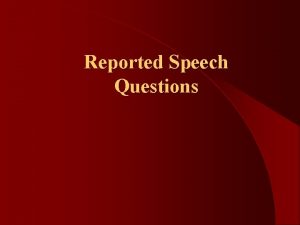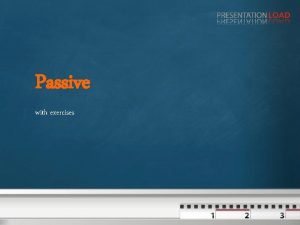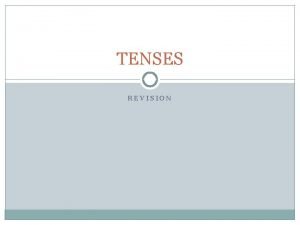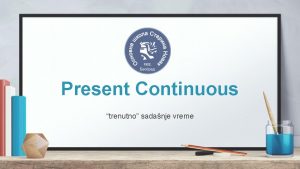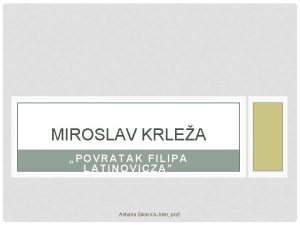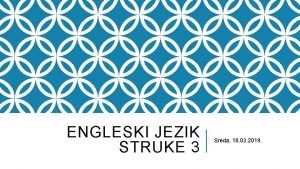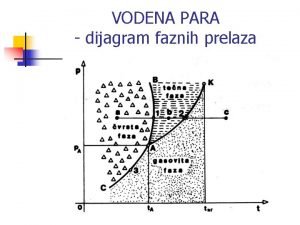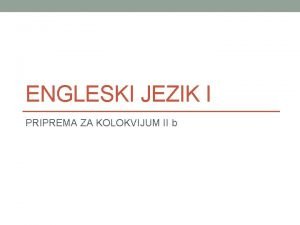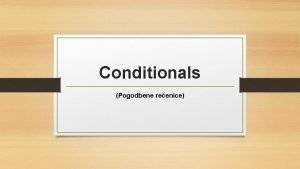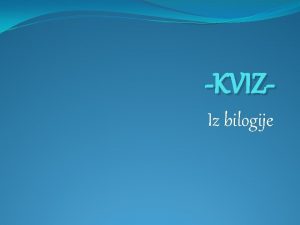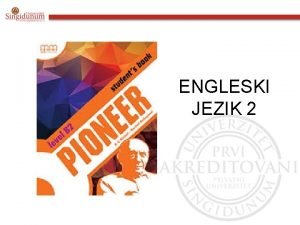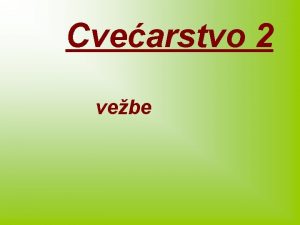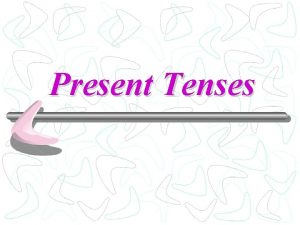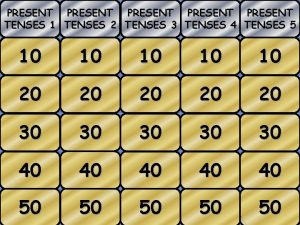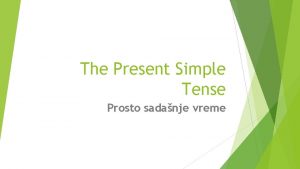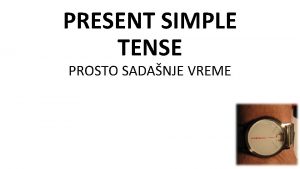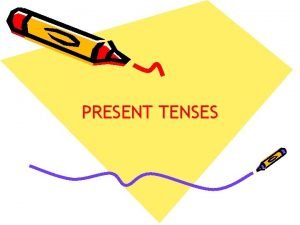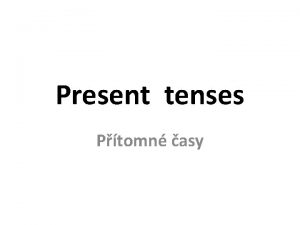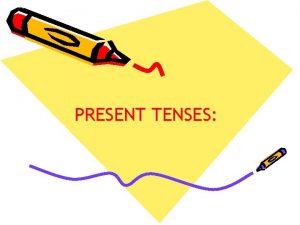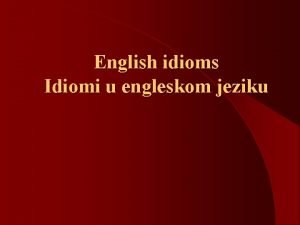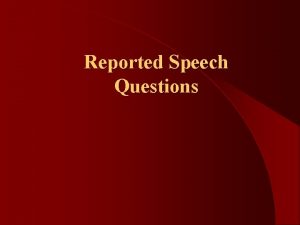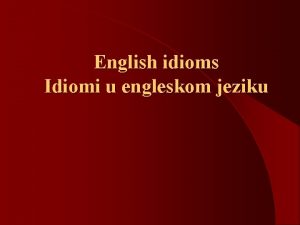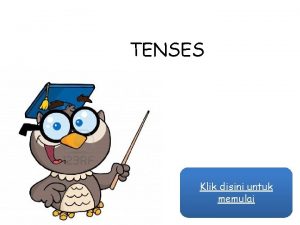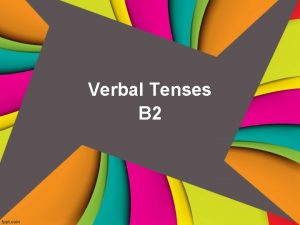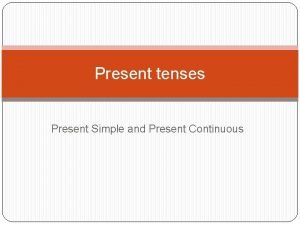Present Tenses Revision Sadanje vreme u engleskom jeziku






















- Slides: 22

Present Tenses Revision

Sadašnje vreme u engleskom jeziku • • • U engleskom jeziku postoje čak 4 sadašnja vremena, i to su: ‣Present Simple (Sadašnje prosto vreme) ‣Present Continuous (Sadašnje trajno vreme) ‣Present Perfect (Sadašnje svršeno vreme) ‣Present Perfect Continuous (Sadašnje svršeno trajno vreme)

Kratak podsetnik. . . • Present Simple Tense se gradi od osnovnog oblika glagola (infinitiv bez to) za sva lica osim za treće lice jednine kada se na infinitiv glagola dodaje nastavak –s ili –es. • U upitnom obliku, koristi se pomoćni glagol DO za sva lica osim za treće lice jednine kada se koristi pomoćni glagol DOES i glavni glagol u infinitivu. • U negativnom obliku koriste se pomoćni glagoli DON’T (do not) ili DOESN’T (does not) za treće lice jednine i glavni glagol u infinitivu.

• Present Simple koristi se za: ‣ navike: I smoke. ‣ opšte činjenice: The Earth goes around the Sun. ‣ nepromenjljive situacije: He works in Vienna. ‣ red vožnje, raspored letenja. . . : The train leaves at 2 o‘clock.

Signal words for Present Simple • Adverbs of frequency: always often usually sometimes seldom never • Other phrases of time: every day every week every year on Mondays after school

• Present Continuous Tense se gradi od pomoćnog glagola TO BE (AM/ARE/IS) u prezentu i glavnog glagola sa nastavkom – ING. • Upitni oblik se gradi inverzijom oblika TO BE (AM/ARE/IS) i subjekta rečenice. • U odričnom obliku dodaje se NOT na pomoćni glagol TO BE (AM/ARE/IS).

• Present Continuous koristi se za: ‣ radnju koja se dešava u trenutku govora: I am reading this text now. ‣ za privremenu radnju (oko trenutka govora): They aren’t working hard these days. ‣ za fiksne planove u budućnosti: They are having a party this weekend.

Signal words for Present Continuous • Actions taking place at the moment of speaking (now) : at the moment now / just now / right now Listen! Look! • Arrangements for the near future: in the morning / in the afternoon / in the evening at noon / tonight tomorrow next. . . • Actions taking place only for a limited period of time: this week / this month / this year

• Present Perfect Tense se gradi od pomoćnog glagola HAVE za sva lica osim za 3 l. j. kada se koristi HAS i glavnog glagola sa nastavkom – ED za pravilne glagole, ili trećom kolonom za nepravilne glagole. • Upitni oblik se gradi inverzijom pomoćnog glagola HAVE/HAS i subjekta rečenice. • U odričnom obliku dodaje se NOT posle pomoćnog glagola HAVE/HAS

• Present Perfect Tense se koristi za: ‣ radnju koja je počela u prošlosti i nastavlja se i u sadašnjosti: We have known each other for 10 years. ‣ radnju koja se desila u neodredjenom trenutku u prošlosti: My car has broken down on the motorway. ‣ životno iskustvo: I have been to Moscow twice.

Signal words for Present Perfect l l • just • yet • never • already • ever • so far • up to now • recently • since • for

l • Present Perfect Continuous se gradi: l HAVE/HAS BEEN + Present Participle (glagol+ing) l • Upitni oblik se gradi inverzijom pomoćnog glagola HAVE/HAS i subjekta rečenice. l • U odričnom obliku dodaje se NOT posle pomoćnog glagola HAVE/HAS

l Present Perfect Continuous se koristi za: l • radnju koja je počela u prošlosti i traje do trenutka govora: l He has been sleeping for 13 hours. l I have been living here since 1998. l • radnju koja je trajala do nedavno, tako da posledice možemo i sada da primetimo: l You look tired. Have you been studying all night? l It has been raining. The ground is still wet.

Signal words for Present Perfect Continuous l • since l • for l • all (day/night) l • the whole day (morning/week/year…) l • how long?

Exercises: I Complete the sentences with the Present Simple form of the verb in brackets. 1. Mum (wash) washes the car once a week. 2. Children usually (like) like ice cream. 3. Do you know (know) the way to the lake? 4. Bob (study) studies French on Saturdays. 5. Every year Helen (go) goes to France. 6. He (not visit) doesn’t visit his friends every day. 7. Does your grandma often call (call) you? 8. The boy is (to be) under the bed. 9. The plane takes off (take off) at 2 o’clock. 10. When does the concert start (start) ?

II Complete the sentences with the Present Continuous form of the verb in brackets. 1. I (watch) am watching a reality show on TV at the moment. 2. My favorite team (win) is winning! 3. Someone (swim) is swimming in the sea now. 4. Two people (cook) are cooking dinner on the beach. 5. We (not watch) are not watching a soap opera right now. 6. I (not do) am not doing my homework at the moment. 7. Look! Mum (read) is reading dad’s magazine. 8. Where are you? We are waiting (wait) for you! 9. When are you coming (come) to see me? 10. Amy (not go) is not going to school today.

III Complete the following sentences in the Present Perfect Tense. 1. Dan has been (to be) sick for three days. 2. Li and Susan have tried (to try) four times already and will not give up. 3. The old car has been (to be) a piece of junk since I bought it. 4. We have not taken (to take) this test before. 5. Have you ever been (to be) to China? 6. Our father has never driven (to drive) to California before. 7. We have known (know) each other for over twenty years. 8. That’s a wonderful movie. I have seen (see) it three times. 9. They have done all their homework already. 10. The class hasn’t started (start) yet.

IV Fill in the correct form of the PRESENT TENSE (simple and progressive) Dear Editor! I am writing(WRITE) this letter because it seems(SEEM) to me that far too many changes are taking(TAKE)place in my country these days, and, as a result, we are losing(LOSE) our identity. I live(LIVE) in a small town but even this town is changing(CHANGE) before my eyes. For example, town authorities are building(BUILD) a burger place where my favorite restaurant used to be. Our culture belongs(BELONG) to everybody, and I don’t understand(NOT UNDERSTAND) why the town leaders aren’t doing(NOT DO) to preserve it. They simply don’t care(NOT CARE).

V Fill in the correct form of the verbs in brackets: 1. They have been in Chicago for 20 years (be). 2. They go to the movies only once in a while (go). 3. Sh! Someone is listening to our conversation (listen)! 4. I think Bob is leaving for London this very moment. (leave). 5. I am not wearing my watch because it is being fixed (not wear). 6. This has been an easy quiz so far (be). 7. They are living in an apartment right now because they can’t find a cheap house. (live). 8. Our daughter has not graduated from the university yet (gradate). 9. She goes to a doctor once a year for an examination (go). 10. Has he ever visited his grandmother? (visit) 11. What do you think of England? (think) 12. Where has he gone? (go)

VI Choose the correct irregular verb (3 rd column) 1. Oh look! That little boy has __ (fall) off his bicycle. l a. fell l b. felt l c. fallen 2. Has she __ (ring) yet? a. rang l b. rung l c. ringed 3. Someone has __ (bring) you flowers again! a. brung b. brought c. brang 4. They've __ (buy) a new car - it's one of those new Fords. a. bought b. buyed c. brought

5. She's __ (send) her mother some chocolates. a. sent b. sended c. send 6. Her children have __ (become) very well-behaved recently. a. became b. become c. becamed 7. He's never __ (forgive) me for that misunderstanding. a. forgiven b. forgave c. forgived 8. We've __ (choose) a new carpet for the living room. a. chosed b. chose c. chosen

9. He's __ (teach) Chemistry for years. a. teached b. taught c. thaught 10. He's __ (know) her for a long time. a. knowed b. knew c. known 11. We've __ (lend) them some money to buy a new house. a. lent b. lended c. lend 12. I haven't __ (write) to the school yet, but I will soon. a. wrote b. written c. writted
 Sadasnje vreme engleski
Sadasnje vreme engleski Past simple vreme
Past simple vreme Sadasnja vremena u engleskom
Sadasnja vremena u engleskom Vreme trece vreme vine
Vreme trece vreme vine Reported speech exercises
Reported speech exercises Pasiv sa dva objekta engleski
Pasiv sa dva objekta engleski Kondicional 1 engleski
Kondicional 1 engleski Functions of present continuous tense
Functions of present continuous tense Present tenses revision
Present tenses revision Upitni oblik present simple
Upitni oblik present simple Active and passive vocabulary
Active and passive vocabulary Sreda engleski
Sreda engleski Povratak filipa latinovicza regina
Povratak filipa latinovicza regina Sreda na engleskom
Sreda na engleskom T-s dijagram
T-s dijagram Engleski jezik pripreme
Engleski jezik pripreme Conditionals
Conditionals Kvizizz
Kvizizz Causative have objasnjenje
Causative have objasnjenje Paprat na engleskom
Paprat na engleskom Hrvatski tekst
Hrvatski tekst Strane svijeta na karti
Strane svijeta na karti Nova piramida ishrane
Nova piramida ishrane
